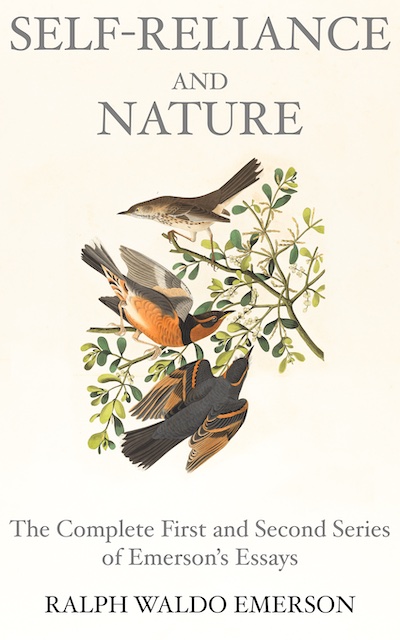Self-Reliance and Nature

Ralph Waldo Emerson's First and Second Series of essays, originally published in 1841 and 1844, remain towering achievements of American literature and philosophy nearly two centuries later. As a central figure in the Transcendentalist movement that flourished in New England in the early-to-mid 19th century, Emerson championed individualism, self-reliance, and a profound reverence for the natural world that still resonate powerfully today. This volume collects some of his most penetrating and enduring works, including the landmark essays "Self-Reliance" and "Nature.
Dipping into Emerson's essays is to enter an astonishingly expansive intellectual world. He seems to have read and grappled with every major thinker and literary work, from Plato and Montaigne to Goethe and Carlyle. Yet this formidable erudition is distilled into a series of startlingly intimate personal reflections. The scope of his inquiries is breathtaking, ranging from the nature of art and beauty to the complexities of politics and reform. But these diverse investigations are united by the common themes that run throughout Emerson's work—the supreme importance of trusting one's own instincts and intuitions, of maintaining a close and reverential connection to the natural world, and of avoiding the stifling pressures of society and conformity. For Emerson, the path to enlightenment and fulfillment lies inward, through rigorous self-examination and reflection.
Nowhere is this ethos clearer than in "Self-Reliance," perhaps Emerson's most famous and influential essay. With stirring, sermon-like prose and piercing psychological insights, Emerson exhorts readers to avoid the "hobgoblins" of consistency and popular opinion, and to trust the promptings of their own souls. "To believe your own thought, to believe that what is true for you in your private heart is true for all men,—that is genius," he declares. These ringing defenses of individualism and non-conformity have become so ubiquitous, appearing everywhere from motivational posters to Nike commercials, that it's easy to forget how radical they were in Emerson's time—and how radical they remain today. Emerson's central message—that truth and morality come from within, not from societal dictates—is as searingly relevant for us as it was for his original audience.
Emerson's deep reverence for the natural world is another constant throughout these essays, reaching its fullest expression in "Nature." In rapturous, almost mystical language, he depicts the wilderness as the ultimate source of beauty, truth and spiritual fulfillment. "In the woods, we return to reason and faith," Emerson writes. "Standing on the bare ground,—my head bathed by the blithe air, and uplifted into infinite space,—all mean egotism vanishes. I become a transparent eye-ball; I am nothing; I see all; the currents of the Universal Being circulate through me; I am part or particle of God." This intimate, poetic communing with the environment was a major influence on later writers and thinkers like Henry David Thoreau, John Muir, and the American conservation movement. Indeed, it's no exaggeration to say that Emerson's ecstatic experiences in nature laid the groundwork for modern environmentalism.
It's hard to overstate the impact that Emerson's essays have had on American literature and intellectual life. From Thoreau and Walt Whitman to Emily Dickinson and Robert Frost, countless writers bear the stamp of his expansive, hopeful, horizon-broadening vision. His emphasis on self-determination and non-conformity became a defining strand of the American ethos, an enduring national ideal. Born to a distinguished Boston family in 1803, Emerson seemed destined for a conventional life in the ministry or academia. But he charted a different path, becoming a prolific essayist, lecturer and philosophical provocateur, urging his audiences to question societal norms and assumptions.
Reading Emerson today, we're struck again and again by his staggering intellectual range, his ability to make the fruits of wide reading feel intimate and personal, and the sheer exuberant power of his language. His dense, abstract, sermon-like prose and occasional moralizing may not be to every modern taste. And his soaring paeans to individualism can sometimes seem blind to the deep social, economic and racial iniquities that constrain so many people's life choices and opportunities. But these flaws are far outweighed by the enduring power of Emerson's writing and thought. At a time of ever-tightening societal pressures, economic anxieties, and algorithmically-enforced conformity, his stirring defense of individual conscience and expression feels more urgent than ever.
"Self-Reliance," "Nature" and the other essays in this collection are not just historical artifacts, but living documents—roadmaps for finding fulfillment and transcendence in a world that often conspires against both. It's a testament to Emerson's genius that his work still has so much to offer us in the 21st century, nearly 200 years after he wrote. These essays reward patient, attentive reading and re-reading; the more time you spend with them, the more Emerson's insights deepen and ramify. If you haven't yet experienced the bracing, perspective-shifting power of Emerson's vision, there's no better place to start than with the First and Second Series. These essays will unsettle your assumptions, stir your soul, and inspire you to lead a more authentic, self-directed, spiritually-awake life.
What more can we ask of a classic?